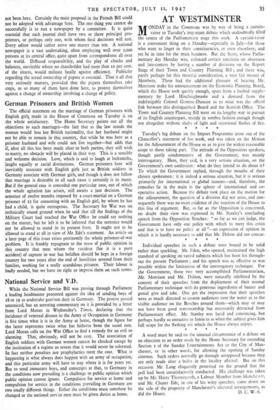AT WESTMINSTER M ONDAY in the Commons was by way of
being a curtain- raiser to Tuesday's important debate which undoubtedly filled' the centre of the Parliamentary stage this week. A curtain-raiser is a convenient thing on a Monday—especially in July—for those who want to linger in their constituencies, or even elsewhere, and yet be in time for the main business. But the Scots, whose Parlia- mentary day Monday was, enforced certain sanctions on absentees and late-corners by having a number of divisions on the Report Stage of their Town and Country Plinning Bill ; and there was, partly perhaps for this material consideration, a very fair muster of Members. These had the additional pleasure of hearing Mr. Morrison make his announcement on the Economic Planning Board, which the House took quietly enough, apart from a barbed supple- mentary by Lord Hinchingbrooke and a demand from the indefatigable Colonel Gamme-Duncan as to what was the official link between this distinguished Board and the Scottish Office. The Town and Country Planning Bill went on its lengthy way in pursuit of its English counterpart, mainly in sombre fashion enough though not altogether without shafts of light and occasional flashes of fire.
* * * * Tuesday's big debate on the Import Programme arose out of the Chancellor's statement of last seek, and was taken on the Motion for the Adjournment of the House so as to give the widest reasonable scope to those taking part. The attitude of the Opposition speakers, though partly condemnatory of the Government, was mainly interrogatory. Here, they said, is a very serious situation, on the Government's own confession: what do they intend to do about it? To which the Government replied, through the mouths of their chosen spokesmen: it is indeed a serious situation, but it is serious primarily Jor international or global reasons—and, therefore, the remedies lie in the main in the sphere of international and co- operative action. Because the debate took place on the motion for the adjournment, the question of a division did not arise, and con- sequently there was no overt evidence of the reaction of the House to this line of argument. But, so far as the Opposition is concerned, no doubt their view was expressed in Mr. Stanley's concluding speech from the Opposition Benches: " so far as we can judge, the Government have only one policy with which to meet this crisis and that is to have no policy at all "—an expression of opinion in which it is hardly necessary to add that Mr. Dalton did not concur. * *
Individual speeches in such a debate were bound to be solid rather than sparkling. Mr. Eden, who opened, maintained the high standard of speaking on varied subjects which has been his through- out the present Parliament ; and his speech was as effective as was possible within the limitations of the interrogatory technique. For the Government; those two very accomplished Parliamentarians, (Mr. Morrison and Mr. Dalton, were naturally inhibited by the content of their speeches from the deployment of their normal Parliamentary technique with its generous ingredients of banter and genial give and take. One got the impression that their speeches were as much directed to unseen audiences over the water as to the visible audience on the Benches around them—which may or may not have been good statesmanship but necessarily detracted from Parliamentary effect. Mr. Stanley was lucid and convincing, but perhaps hardly so attractive to listen to as when the subject gives him full scope for the flashing wit which the House always enjoys.
A word must be said on the unusual circumstance of a debate on an objection to an order made by the Home Secretary for extending Section r of the Sunday Entertainments Act to the City of Man- chester, or in other words, for allowing the opening of Sunday cinemas. Such orders normally go through unopposed because they are only made after a ballot in the locality affected. But on this occasion Mr. Lang eloquently protested on the ground that the poll had been unsatisfactorily conducted. His challenge was taken up by Mr. Harry Thorneycroft, a Labour Member from Manchzster, and Mr. Chuter Ede, in one of his witty speeches, came down on the side of the propriety of Manchester's electoral arrangements, as


































 Previous page
Previous page